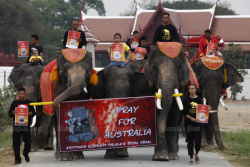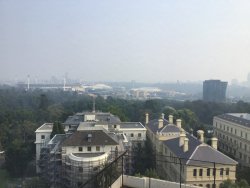This is an interesting read on fires climate change...
Written by Les Crowe.
I am writing this because I am appalled at the amount of near-hysterical reaction to the recent NSW and Qld bush-fires. My reasoning is not so much about the fires or the people affected, but about whether "man-made" climate change is the underlying cause. Before I go further, my stance is not so much a personal, but rather a professional reaction.
I begin by telling those of you who don't know, for a period of some 40 years, my work as a loss adjuster was involved with natural disasters, ranging from Cyclone Tracey through to a lesser involvement in 2009. I was appointed as National Chief Loss Adjuster, an advisory role, to the Insurance Council of Australia on all-natural disasters but particularly bush-fires. This role was interactive with all agencies and spanned more than 10 years. It was both proactive in planning stages and reactive after the event. I was heavily involved in the 1983 Victorian fires.
I acknowledge the advice of The Bureau of Meteorology and the Climate Council, is a reality to the effect the projected changes to climate, was derived from modelling, which strongly suggested change would occur unless man-made contribution was reduced.
Somehow or other, sections of our communities, have taken control of the scientific argument about the future and have interpreted it to mean the change has already occurred. Not so. Records I have seen, actually show that the slight upward trend in temperatures on a global scale seems to be in direct line with the earth's ever occurring"natural" climatic change patterns. History shows numerous ice ages, when the planet cooled, to corresponding heating up periods, over billions of years. This has always occurred. It is the nature of our planet and cannot be influenced by what man can or cannot do. On the other hand, the impact of humans is a future projection, well-founded on scientific modelling.
The true position, despite all the comments about what the current fires mean in a climate change scenario, is nobody can tell if there is any connection.
What I can tell you with absolute certainty is that these fires, as bad as they were, are no more intense, widespread, dangerous or unexpected in outcome, too many previous and historic events. There is no accurate method to measure such outcomes. However, it is possible to look at prevailing conditions and contributing factors to seek patterns or influential factors.
Take a look at the following comparative data, much of which has been ignored by the frantic argument to directly link man-made climate change to the outbreak and effects of these latest fires. I detail some of the arguments I have heard go unchallenged or are simply ignored and unreported, particularly by the ABC who are the appointed official national disaster communications service.
This the first time such fires have been rated as catastrophic. True, but not because they were rated any worse than many previous fires. In 2009, following the bush-fire inquiry, the defined categories of fire were renamed. Catastrophic was introduced as the most severe warning. So this description was never intended to make people think they were the worst fires ever. I have heard many media reports entrench this mistake.
The fires are occurring earlier because of climate extending the summer risk. Can only be applicable in the North. However, NSW has a long history of November and December bush-fires. In 1944, the Blue Mountains lost 27 homes and other property in November. Since then, I can recall at least 3 other similarly timed events in NSW. So this year was not unique, as has been strongly inferred by many reporters. In southern areas, January and February have historically been prone to outbreaks. These fires are the most widespread and worst ever. They certainly were disastrous. However, it is impossible to compare unless it can be based on raw data….
Have more lives been lost than ever before. No, although 1 is far too many, in 2009, 173 people died. In 1983, 75 people died. In 1962, 62 people died. In that decade one of the victims in Eltham North was George Crowe, my Grandfather and Grandma's father in law. In 1967, it was reported that 2,600 square kms of land was devastated in just 5 hours (Just try to imagine that ferocity). In 2009 there were 2030 homes destroyed and in 1983 there were 6,000 homes and other buildings destroyed. Does this define which fire was the worst? NO. All fires are bad but to try and claim the current fires are the worst ever is a blatant disregard for historical fact. Worse still, it is a deliberate attempt to scare people into accepting the fanatical side of the global warming argument, by accepting radical changes to our economy, power generation and mining {let alone agriculture and transport} must occur right now and in a premature manner. The so-called re-definition of the predicted changes into an emergency is a way to virtually destroy our entire way of life.
The fires were started as a result of climate changed conditions. Clearly wrong. 80% of fires were started by people either deliberately or accidentally lighting them. Dry lightning strikes have been long recorded and are nothing new.
What has our Media and ABC generally ignored? One of the clearest data-based facts, reported out of the 2009 Inquiry, was the finding that fire intensity is proportional to and severely aggravated by fire loads created by undergrowth and forest floor debris accumulation. We can't control wind and heat but we can control fuel load. Ask any active Rural or Country serving fireman what they think of this hazard.
Then ask your Green Party representative, why they have influenced the management of National Park maintenance, as well as local government reserves, to leave far too much of the forest floor intact at any cost. Winter back burning, firewood removal and general debris clearance have been widely restricted by stupid laws. They argue it preserves natural ecosystems that rely on such decaying material. Well, systematic removal of this fuel load may well disrupt some Eco-systems, consider this; A bush-fire positively destroys them all.
The only identifiable and the recently introduced risk factor is the environmental law changes that have impacted a fire's intensity potential and capacity to burn faster and hotter.
Find this hard to believe, Go into a forest and try setting fire to a living gum tree with a match. Now stoop down and see if you get any better results from the dead and therefore dry undergrowth at your feet. This is the effect ember spread has on adjoining bush-land.
There is much more to say about bringing sanity back into discussions and I have my own opinion that if you believe the science of global warming, stick to the science and ignore the fanatical self-professed experts, like some of the current crop of Green Party politicians and shrieking media, self-appointed, experts. No, before it can be said. I was not self-appointed in my former career positions.
I can only reflect that the handful of ex-firemen who were paraded before the media, may have had other agendas. The spokesman listed his current occupation as a "Climate Change Consultant". Another said outright, on camera, that fires have always been linked to climate change. I prefer to listen to our Indigenous community who talk of bush-fire management over thousands of years. – oops; before any hint of an industrial age, meat production or mining.






























